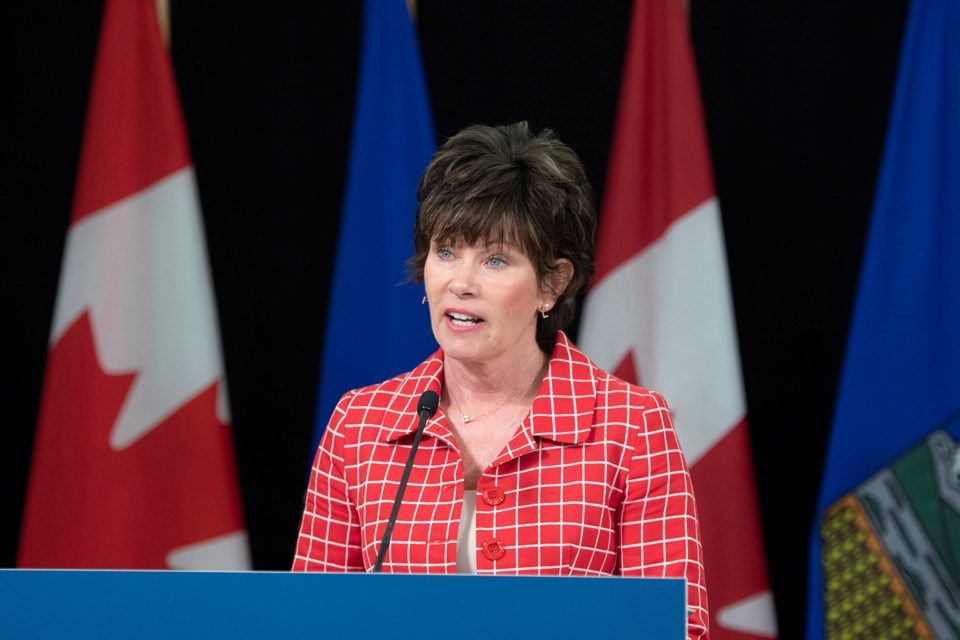SUNDRE — Hindsight, as the saying goes, is 20-20.
In a sudden and spectacular reversal on a decision the government had as recently as last week been staunchly defending, Minister of Energy Sonya Savage admitted during a press conference following widespread public outrage that Albertans should have been consulted prior to the provincial government’s arbitrary decision to last spring rescind the 1976 Coal Policy.
“What we’re doing today, keeping the 1976 Coal Policy in place, and committing to consult on a modernized policy, is what we should have done in the beginning,” Sonya Savage told reporters on Monday morning.
“We didn’t do it then, but we’re going to do it now,” said Savage.
Pressed by reporters why the government did not simply seek to consult Albertans in the first place prior to rescinding the policy, she said, “We should have done better. And we admit that we didn’t get this one right. We’re not perfect, and Albertans sure let us know that. We could have done a better job.”
But she added that from the government’s perspective, the policy was obsolete and predated modern understanding of climate change and intended to update the administrative process by which the department of energy issues leases.
“What we didn’t anticipate was the unintended effect of removing the coal categories, and Albertans felt that that removed restrictions that were in place,” she said.
The government’s announcement means the four coal categories outlined in the Peter Lougheed-era policy that dictated where and how coal leasing, exploration and development could occur, are fully reinstated, she said.
The minister said she also issued directives to the Alberta Energy Regulator — an industry funded regulatory body that reviews and considers proposed energy projects — that mountaintop removal will be banned and that all of the restrictions under the 1976 coal categories are to apply, including restrictions on surface mining in Category 2 lands. Additionally, all future coal exploration approvals on Category 2 lands will be prohibited pending public consultations on developing on modernized policy.
Further elaborating, Savage explained that there are six projects that are being explored for potential development.
“This means that core samples are being taken, perhaps roads are being built — it does not mean a project will be developed.”
Also, exploration on four of those projects had already begun under the 1976 policy before it was rescinded, she said.
“That means that the 1976 Coal Policy did not preclude coal lease exploration, and it also means that putting it back won’t necessarily end exploration.”
The reinstatement of the policy does not affect existing coal exploration and mining on any other categories of land, she added.
Details on how the new coal policy consultation process will proceed are to be provided in the coming weeks, she said.
“It won’t be a short process.”
Offering insight on the government’s initial decision, the minister said, “We felt that a number of its provisions had become outdated. For example, the policy predated what we now know about climate change, and it referred to thermal coal as being a clean source of energy.”
The government also wanted to streamline regulatory matters and to provide more certainty for the government and stakeholders.
“However, Albertans’ views are clear — they expect us to manage coal differently,” she said.
“We will continue listening until we get this right.”
The coal industry plays an important role in the provincial economy, and the government intends to continue a long legacy of responsible development while ensuring future generations get to enjoy Alberta’s natural spaces, she said.
When asked why the government was bringing back a policy that Premier Jason Kenney recently called a “dead letter,” Savage reiterated that aspects of the document were obsolete, but recognized the concerns expressed by Albertans.
“We had heard from a lot of Alberta — a lot of Albertans — that that’s what they wanted,” she said.
“What Albertans expressed concern over, is that they felt some of the restrictions and protections that were in the categories of the 1976 coal policy had been lost, and a result that something had changed. That was not our intention, and that’s why we are reinstating the policy in full.”
Answering a question about whether companies would be inclined to continue exploration given the uncertainty of actually being able to be approved for additional mining permits in the future, she responded that there would be no new approvals for exploration activities pending consultation.
But with respect to the six exploration permits already approved, she added, “I think it will be up to companies to determine how they manage their coal exploration program. But we don’t intend to remove approvals that were already granted by the regulator.”
Given that the AER has been directed to ban mountaintop mining, and that Category 2 lands do not allow surface mining, the minister was also asked what impact the government expects on its plans to expand the industry, generate jobs and royalties.
Making clear that mountaintop mining “will never be allowed in Alberta,” the minister said there nevertheless remains a global market for metallurgical coal for the production of steel, and that the government wants to ensure responsible coal mining can occur in the future.




